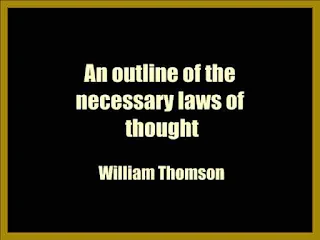An outline of the necessary laws of thought
A treatise on pure and applied logic
One account of the exact position which this work pretends to occupy amidst a crowd of valuable treatises on the same subject may not^be an unfitting introduction to its pages.
The system of Pure Logic or Analytic that has been universally accepted for centuries past, is very defective as an instrument for the analysis of natural reasoning. Arguments that commend themselves to any untaught mind as valid and practically important, have no place in a system that professedly includes all reasoning whatever; and an attempt to reduce to its technical forms the first few pages of any scientific work, has generally ended in failure and disgust.
The consequence has been that the more popular writers on Logic have begun to treat its strictly technical parts with a certain coyness and reserve. They have denied to the rules of the syllogism that prominent place once assigned to them, yet at the same time, they have refrained from rejecting as cumbrous and unnecessary an instrument. which did not subserve any practical end in their systems.
The present work is an attempt to enlarge the science of Pore Logic, so that it may be adequate to the analysis of any act of reasoning. How far it has attained its object ought to be decided by the application of its principles to many miscellaneous examples from different sciences; and whilst I have rigorously and frequently applied this test to it for many years, I cannot hope that the partiality of ac author will be a sufficient guarantee of its pretensions, and therefore commend the same line of examination to anyone who believes, with me, that a sedulous practice of logical analysis will richly reward the understanding with accessions of strength and clearsightedness.
If the result should be the detection of many errors and omissions on the author's part, enough of matter may perhaps be left unshaken, to prove that Pure Logic is not the mere officina veteramentaria — ^the warehouse of useless relics — it is too often taken for, but a practical system — an im- portant branch of mental culture. To Sir William Hamilton, of Edinburgh, whose death every student of philosophy may deplore as a personal loss, I am greatly indebted for valuable assistance, freely and generously afforded, at the cost of much time and trouble.
There is no longer any fear that such an acknowledgement will be misconstrued into an admission that the present work only reports the opinions of that illustrious philosopher as he has himself recognized its claim to an independent position.
In truth, the extension of the syllogism, the enlarged list of immediate inferences, the doctrine of the three aspects of propositions, in Extension, Intension, and Denomination, and the grounds for rejecting the Fourth Figure of Syllogism, which serve, with other things, to give this little book its character, were worked out originally without assistance from any living author, from such materials as any student might command; and it may perhaps be permitted me, without seeming to court a damaging comparison, to point out that the twelve affirmative modes of Syllogism in each figure, which here replace the much more limited number of the old system, are precisely those which Sir William Hamilton has found it necessary, on his own principles, to adopt.
Some contents:
1. Processes precede laws 17
2. Origin of Logic 18
3. Logic, pure and applied 20
4. Tliis distinction defended 21
5. Pure Logic 23
6. Logic a Science 26
7. Unconsciousness in Art 28
8. Logic a practical Science 30
9. Logic defined 30
10. Its limits 32
11-15. Form and Matter 83
16. First and Second Intentions 40
Language.
17. Thought and Language 42
18. Language defined T 43
19. Language has four functions 43
20. It aids analysis 44
21. Degrees of this power 45
22. Speech is the highest language. Why t 43
23. 24. It records thoughts 49
25. It shortens thinking 69
26. It communicates thoughts 64
26*. Aristotle's view of words 56
27. Speech not essential to thought 68
28. Though signs maybe 60
29. Origin of language 61
30. 81. Growth of language 68
Publication date: 1863
Download 7 MB PDF book

